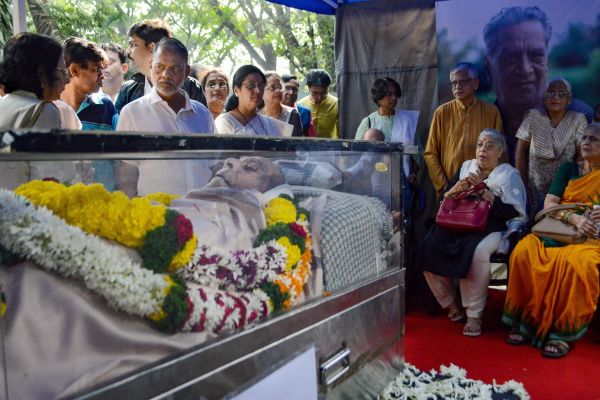Pune (Maharashtra): Maharashtra bid a tearful adieu to veteran actor Shreeram Lagoo – oft referred to as the ‘Emperor of Acting’ – was cremated with full state honours here Friday afternoon.
Lagoo, 92, passed away late on Tuesday (Dec 17) following prolonged illness and age-related problems, shocking the film industry and stage which he served for over five decades. He is survived by his wife and a son.
Revered as the ‘Emperor of Theatre’, his body was kept for people to pay their last respects at the Balgandharva Rangmandir on Friday for a few hours before the last rites.
Draped in the National Tricolour, Lagoo’s mortal remains, encased in a glass casket, were later brought to the open ground outside the Balgandharva Rangmandir where the Maharashtra Police accorded a 21-gun salute to the acting legend.
Later, at the sounding of three bells – symbolizing the start of a theatre performance – the huge funeral procession wend its way to the Vaikunth Crematorium, around 3 kms away.
Among the prominent personalities who paid floral tributes to the renowned actor included Maharashtra Minister Subhash Desai, Maharashtra Navnirman Sena President Raj Thackeray, Baba Adhav, Hindi and Marathi film and stage personalities like Jabbar Patel, Amol Palekar, Nana Patekar, Urmila Matondkar, Ramdas Futane, Sudhir Gadgil, Nandu Madhav, Pushkar Kshotri, Prasad Oak among others.
Present were several representatives of rationalist organisations like Maharashtra Andhashraddha Nirmoolan Samiti, leftist and forward groups, a large number of fans, admirers and citizenry, many seen breaking down or weeping.
Among his memorable performances in theatre and films were “Natsamrat”, Richard Attenborough’s “Gandhi”, “Souten”, “Singhasan”, “Saamna”, “Gharaonda”, “Pukar”, “Inkaar”, etc.
The nation, led by Prime Minister Narendra Modi, Maharashtra Chief Minister Uddhav Thackeray, top political leaders, film personalities and eminent people from different walks of life condoled the passing of Lagoo.
Born on November 16, 1927, in Satara, Lagoo completed his higher and medical education in Pune and became a ENT surgeon, with stints in UK and Africa. From his college days, he was attracted to theatre and performed in many plays, but plunge fulltime into professional acting only in 1969.
After that, there was no looking back and he worked in around 300 plays and Hindi and Marathi films, directing many Marathi dramas, and was decorated with awards and accolades, in the past five decades.
A self-professed rationalist who was close to the MANS founder, the late Narendra Dabholkar, in his later years, despite being afflicted with Parkinson’s Disease, Lagoo was seen in his film role in “Shasan” (2016).
Some of Lagoo’s memorable performances were in Marathi films: Sinhasan (1980), Samna (1974), Pinjra (1973), Zaakol (1980), Khichadi (1982), Mukta (1995), Masala (2012) and Shasan (2015).
Marathi Theatre: Vedyache Ghar Unhat, Jagannathacha Rath, Gidhade, Kachecha Chandra, Himalayachi Sawali, Natsamrat, Surya Pahilela Manus, Aadhe Adhure. Garbo, Atmakatha, Kanyadaan, Pappa Saanga Kunache!, Premachi Goshta?, Khoon Pahava Karoon, Dubhang, Sundaar Mi Honaar, Kirwant, and Mitra.
Hindi/Marathi films: Pinjra (1972), Ponga Pandit (1975), Hera Pheri, Bullet, Chalte Chalte, Barood (all 1976), Immaan Dharam, Kitaab, Kinara, Inkaar, Gharaonda (1977), Des Pardes, Phool Khile Hain Gulshan Gulshan, Muqaddar Ka Sikandar, Devata, Saajan Bina Suhagan, Shalimar, Arvind Desai Ki Ajeeb Dastaan, Anjaam (1978), Simhasan, Sargam, Jurmana, Manzil, Tarana, Hum Tere Ashiq Hain, Dooriyaan (1979).
Later, he was seen in Kasturi, Do Aur Do Paanch, Kashish, Lootmaar, Thodisi Bewafaii, Jyoti Bane Jwala, Gehrayee, Insaaf Ka Tarazu, Jwalamukhi, Swayamvar (all 1980), Agni Pareeksha, Laawaris, Zamaane Ko Dikhana Hai, Professor Pyarelal (1981), Daulat, Raaste Pyar Ke, Chorni, Deedar-E-Yaar, Gandhi, Vidhaata, Kaamchor (1982), Souten, Pukar, Kalaakaar, Sadma, Hum Se Hai Zamana (1983), Tarang (1984), Hum Naujawan (1985), Ek Main Aur Ek Tu, Singhasan (1986), Ghar Sansar, Ek Pal (1986), Kala Bazaar (1989), Khuddar (1994), and Shasan (2016).
